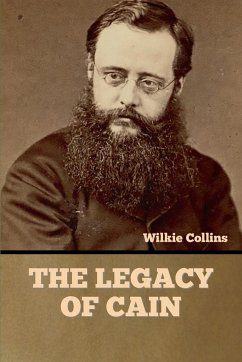Novel dedicated to Mrs Henry Powell Bartley (Carrie Graves) acknowledging her skill and patience in copying manuscripts for the printer. Henry Bartley was Collin's solicitor and, ironically, embezzled from the estate - the fate suffered by Miss Jillgall in the story. Published in 1888, it was the final novel completed by Collins and the last to be syndicated by Tillotson. The Legacy of Cain explores the theme of hereditary evil, and attacks the idea that 'bad blood' necessarily results in a criminality. BIO William Wilkie Collins (8 January 1824 - 23 September 1889) was an English novelist and playwright known for The Woman in White (1859) and The Moonstone (1868). The last has been called the first modern English detective novel. Born to a London painter, William Collins, and his wife, the family moved to Italy when Collins was twelve, living there and in France for two years, so that he learned Italian and French. He worked at first as a tea merchant. On publishing his first novel, Antonina, in 1850, Collins met Charles Dickens, who became a friend and mentor. Some Collins works appeared first in Dickens's journals Household Words and All the Year Round. The two also collaborated on drama and fiction. Collins reached financial stability and an international following in the 1860s from his best-known works, but began to suffer from gout. He took opium for the pain, but became addicted to it. His health and his writing quality declined in the 1870s and 1880s. Collins was critical of the institution of marriage: he later split his time between widow Caroline Graves, with whom he had lived most of his adult life, treating her daughter as his, and the younger Martha Rudd, by whom he had three children. Collins's works were classified at the time as "sensation novels", a genre seen nowadays as the precursor to detective and suspense fiction. He also wrote penetratingly on the plight of women and on the social and domestic issues of his time. For example, his 1854 Hide and Seek contained one of the first portrayals of a deaf character in English literature. As did many writers of his time, Collins first published most of his novels as serials in magazines such as Dickens's All the Year Round, and was known as a master of the form, creating just the right degree of suspense to keep his audience reading from week to week. ... Collins died at 82 Wimpole Street, following a paralytic stroke. He is buried in Kensal Green Cemetery, West London. His headstone describes him as the author of The Woman in White. (wikipedia.org)
Hinweis: Dieser Artikel kann nur an eine deutsche Lieferadresse ausgeliefert werden.
Hinweis: Dieser Artikel kann nur an eine deutsche Lieferadresse ausgeliefert werden.








